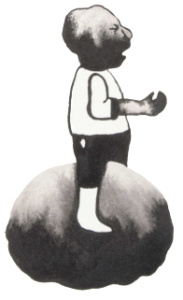European Court of Justice 09/10/08,
Important Poems
On 9 October 2008 the European Court of Justice (ECJ) answered a preliminary question from the German Bundesgerichtshof about the concept of ‘extraction’ from the Databases Directive. Under the Databases Directive, the producer of a database obtains an exclusive right with which he can oppose ‘extraction’ and ‘re-utilization’ by third parties. The present case had to do with the first-mentioned concept. The case was as follows: at Albert-Ludwigs-Universität in Freiburg a project named ‘Klassikerwortschatz’ is running, in the scope of which the Freiburger Anthologie is being published. The Freiburger Anthologie is an anthology of German-language poems from the period 1720-1933. This anthology is based on a list of 1100 poems: Die 1100 wichtigsten Gedichte der deutschen Literatur zwischen 1730 und 1900, which was composed by a staff member of the university with the help of other anthologies and out of a total of approx. 20,000 poems. This selection took about 2.5 years and cost 34,900 euro. Directmedia has been bringing a CD-ROM on the market in Germany since 2002 entitled ‘1000 Gedichte, die jeder haben muss’. Of these 1000 poems, 876 date from the period between 1720 and 1900, and 856 of these poems are also mentioned in the list of the university. Directmedia maintains that it used this list (that was available to the public through the internet) as a guide for the composition of its CD-ROM, and has subsequently omitted certain poems and added others. Directmedia had taken the text of the poems from its own digital sources. So this case is not about the text of the poems, but only about the selection that the university made.
Extraction
The university states that Directmedia infringes its rights as maker of a database by bringing this CD-ROM on the market. According to the university, the selection of ‘Die 1100 wichtigsten Gedichte…’ is a database, and the use that Directmedia has made of it can be regarded as infringement. After it was established that ‘Die 1100 wichtigsten Gedichte…’ is indeed a protected database, the Bundesgerichtshof ruled that the question whether there was infringement depended on the meaning given to the concept of ‘extraction’ in the Databases Directive.
‘Extraction’ is defined as follows in Article 7 (2) under a of the Databases Directive: ‘the permanent or temporary transfer of all or a substantial part of the contents of a database to another medium by any means or in any form’. In brief, extraction concerns the reproduction of the database. Because Directmedia took Die 1100 wichtigsten Gedichten as a basis, but then made its own selection out of it, the Bundesgerichtshof wondered if this is really still within the concept of extraction. After all, the database has not simply been copied one-on-one, but rather an adaptation of it has been made. Therefore the Bundesgerichtshof has sought the opinion of the ECJ to find out whether copying data through consulting and evaluating a database is also included in the concept of extraction, or whether extraction is limited to the mere (physical) copying of a database. In brief, the ECJ had to determine whether the concept of extraction should be given a broad or a narrow interpretation. The Bundesgerichtshof advocated a limited interpretation of the concept of ‘extraction’, but acknowledged that other interpretations are possible too. However, the ECJ ruled that ‘extraction’ is to be interpreted broadly: the definition of ‘extraction’ by the legislator – ‘the permanent or temporary transfer of all or a substantial part of the contents of a database to another medium by any means or in any form’ – indicates according to the ECJ that the community legislator has wished to ascribe a broad meaning to the concept. Furthermore, in the objective of the Databases Directive (the protection of the investment of the manufacturer of a database) the ECJ also sees an argument in favor of a broad interpretation of the concept of ‘extraction’. The Directive also protects non-electronic databases, and this is an argument for ‘extraction’ not to be limited, no more than the concept of ‘database’, by formal, technical or physical criteria.
Infringement of Database Right?
The ECJ has thus given a broad interpretation to the concept of ‘extraction’. The question whether Directmedia is actually infringing the database right of the university must be answered by the national court itself, but after this judgment, this does not seem unlikely at all. In general it can be said that the database producer has been given more room, since this judgment has made it clear that the maker can not only take action against the one-on-one copying of his database, but also against ‘adaptations’ thereof.

